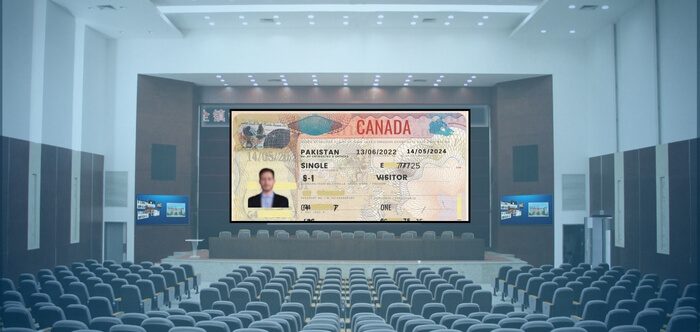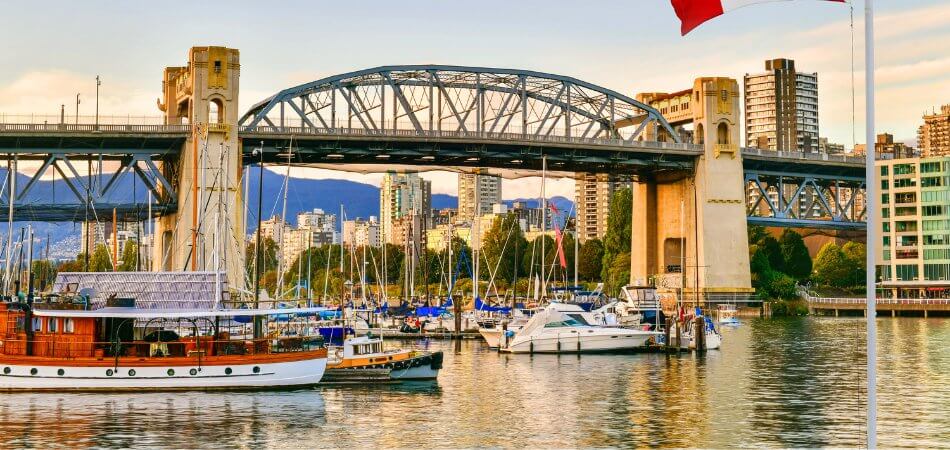Traveling to Canada for a conference can be both an exciting and intricate process, especially when considering the options for extending your stay beyond the event. A question that often arises is, “Is it possible to travel to Canada on a conference visa after the conference?”
Yes you can, but it completely depends on the type of visa you have. If you have a multiple entry visa, the opportunity to explore Canada further after your conference becomes a viable option.
This flexibility allows you to immerse yourself in the diverse cultural and natural landscapes of Canada beyond the conference halls. To understand the specifics of how this works and what you need to know, continue reading our comprehensive guide. We’ll dive into the details, ensuring you make the most of your Canadian journey.
A Brief About Conference Visas in Canada
Conference visas in Canada serve a specific purpose, allowing attendees to participate in international conferences, seminars, or professional events. These visas are typically short-term, designed for the event’s duration. It’s essential to note that they do not automatically permit tourism or other activities outside the conference.

The application process for a conference visa requires attendees to provide details about the event and their role in it. This includes invitations or registrations related to the conference. Successful applicants must adhere to the visa’s terms, which are strictly for the event’s duration and purpose.
Holders of a conference visa must plan their itinerary around the event’s schedule. However, with a multiple-entry visa, there’s an opportunity to re-enter Canada for tourism or other purposes. This flexibility is contingent on the visa’s validity beyond the conference dates.
Different Types of Visas That Well Suited for Conferences in Canada
Attending a conference in Canada requires selecting the right visa to ensure compliance with immigration policies. The type of visa depends on the nature of your visit and nationality. Understanding the different options available is crucial for a smooth travel experience.
Temporary Resident Visa (TRV)
A Temporary Resident Visa is ideal for short-term visits, including attending conferences. It’s suitable for individuals from countries without a visa exemption or eTA agreement with Canada. The TRV covers the duration of the conference and allows for some tourism activities.
Electronic Travel Authorization (eTA)
For citizens of visa-exempt countries, the eTA is a simpler alternative. This authorization is electronically linked to your passport and is ideal for short conference visits. It streamlines entry into Canada, making it convenient for frequent travelers.
Business Visitor Visa
Specifically tailored for business-related travel, this visa suits those attending conferences, meetings, or networking events. It requires proof of the business nature of your visit and does not allow for employment in Canada.
Super Visa
The Super Visa is an option for parents or grandparents of Canadian citizens attending family-oriented conferences or events. It offers longer duration stays, up to two years, without the need for renewal.
Choosing the appropriate visa for conference travel in Canada is crucial for a hassle-free experience. Each visa type caters to different needs and requirements, ensuring that visitors can attend their events with peace of mind. Always consult the latest immigration policies to select the visa best suited for your conference attendance.
Requirements For Getting a Canadian Conference Visa
Securing a Canadian conference visa involves meeting specific criteria set by the Canadian government. These requirements are essential to ensure a smooth application process. Applicants must provide detailed information and documentation to be considered for the visa.
- Valid Passport: Your passport must be valid for the duration of your stay in Canada. It should have at least one blank page for stamping by immigration officials.
- Conference Registration Proof: Evidence of conference registration is mandatory. This can include an invitation letter or confirmation emails from the event organizers.
- Financial Means: Applicants must show they have sufficient funds to cover their stay. Bank statements or sponsor letters can serve as proof of financial stability.
- Travel Itinerary: A detailed travel itinerary should be provided. This includes flight bookings, hotel reservations, and a conference schedule.
- No Criminal Record: A clean criminal record is essential. Police clearance certificates may be required to prove this.
- Medical Fitness: Some applicants might need a medical exam. This ensures they pose no health risk to others during their stay.
Obtaining a Canadian conference visa requires thorough preparation and adherence to specific requirements. Applicants should ensure they have all the necessary documents and meet all criteria to facilitate a successful visa application. Careful attention to these details can significantly enhance the chances of visa approval.
Is it Possible to Travel to Canada on a Conference Visa After the Conference?
Yes, it is possible to travel to Canada after attending a conference, depending on the type of visa you have. A multiple-entry visa, in particular, allows for such flexibility.
Type of Visa
- The type of visa dictates post-conference travel possibilities.
- A multiple-entry visa permits re-entry into Canada for tourism or business.
- Single-entry visas, however, restrict travel to the conference period only.
Visa Validity
- The validity period of your visa is crucial.
- Ensure your visa remains valid beyond the conference dates for further travel.
- Expired visas necessitate a new application process for re-entry into Canada.
Immigration Rules Compliance
- Adhering to Canadian immigration rules is essential.
- Overstaying or violating visa terms can lead to future entry denials.
- Always respect the purpose and duration specified in your visa.
Traveling within Canada after a conference is viable with the right visa type, particularly a multiple-entry visa. Always check your visa’s validity and adhere strictly to the terms set by Canadian immigration to ensure a trouble-free experience.
Which Types of Visas are Suited for Extending Your Conference Visit?
For those looking to extend their conference visit in Canada, choosing the right visa is crucial. The type of visa you select depends on your plans post-conference, whether it’s for leisure, additional business, or family visits. Here’s a breakdown of the visa types suitable for extending your conference visit, presented in the requested format.
Multiple Entry Temporary Resident Visa (TRV)
The Multiple Entry Temporary Resident Visa (TRV) is a versatile option for conference attendees. It allows multiple entries into Canada for up to six months per visit. This visa is particularly beneficial for those who plan to explore Canada or attend multiple events over time. Its flexibility is a significant advantage for academic or business professionals involved in ongoing projects or collaborations in Canada.
The validity of a Multiple Entry TRV can extend up to 10 years, depending on your passport’s expiry date. This long-term option requires applicants to demonstrate strong ties to their home country, ensuring their return. The visa is ideal for those who foresee frequent visits to Canada, be it for conferences, business, or leisure.
Super Visa
The Super Visa is specifically tailored for parents and grandparents of Canadian citizens or permanent residents. It’s an exceptional choice if you’re planning to combine a conference visit with an extended family stay. This visa allows for longer durations of stay – up to two years without the need to renew – which is significantly longer than standard visitor visas.
Qualifying for a Super Visa involves stringent requirements, including a medical examination and valid Canadian medical insurance. Applicants must also provide proof of their relationship to the Canadian resident. While not a conventional choice for all conference attendees, the Super Visa offers unique benefits and extended stay options for those eligible, making it an excellent choice for those looking to combine professional and personal visits.
The Multiple Entry TRV and Super Visa are two distinct types of visas suited for extending a conference visit in Canada. Each caters to different needs, with the Multiple Entry TRV offering flexibility for frequent visits, and the Super Visa providing a longer duration stay for family-oriented visits. Understanding these options ensures a more enjoyable and compliant extended stay in Canada.
Tips to Properly Plan Your Conference Visit
Planning a successful conference visit requires foresight and organization. From travel arrangements to networking opportunities, every detail matters. Here are some key tips to help you properly plan your conference visit, ensuring a productive and enjoyable experience.
- Early Registration: Secure your conference spot by registering early. This often comes with the benefit of early bird discounts.
- Accommodation Booking: Choose accommodations close to the conference venue. It saves travel time and offers networking opportunities with other attendees.
- Travel Itinerary: Plan your travel itinerary meticulously, including flights, local transport, and any post-conference tours or activities.
- Visa Application: Apply for your visa well in advance. Ensure you meet all requirements to avoid last-minute complications.
- Networking Goals: Set clear networking goals for the conference. Identify key speakers or attendees you wish to connect with.
- Conference Schedule: Familiarize yourself with the conference schedule. Plan to attend sessions and events that align with your interests or field.
- Cultural Preparation: Research the local culture and etiquette, especially if traveling internationally. This shows respect and aids in smooth interactions.
- Backup Plans: Have backup plans for unexpected scenarios, like flight delays or session cancellations. Flexibility is key in travel planning.
- Budgeting: Prepare a detailed budget covering all aspects of your trip. This includes conference fees, travel, accommodation, and daily expenses.
- Health Precautions: Stay informed about any health advisories or vaccination requirements. Carry necessary medications and health insurance information.
Planning your conference visit involves attention to various aspects, from logistics to networking objectives. By following these tips, you can ensure a well-organized and rewarding experience. Effective planning not only enhances your conference participation but also allows you to enjoy the journey and make the most of the opportunity.
Final Thoughts
The prospects of extending your stay in Canada after a conference depend significantly on your visa type, as highlighted by the query, “Is it possible to travel to Canada on a conference visa after the conference?” With a well-chosen visa, like the Multiple Entry Temporary Resident Visa or the Super Visa, staying beyond the conference becomes achievable.
Each of these visas offers unique advantages for different travel intentions. Essential to a successful visit is meticulous planning, which includes everything from securing early conference registration to understanding local customs. Furthermore, meeting the Canadian conference visa requirements, such as showing proof of conference attendance and financial means, is vital.
Therefore, with appropriate visa selection and detailed planning, one can seamlessly transition from a conference attendee to an explorer of Canada’s diverse landscapes and cultures.







